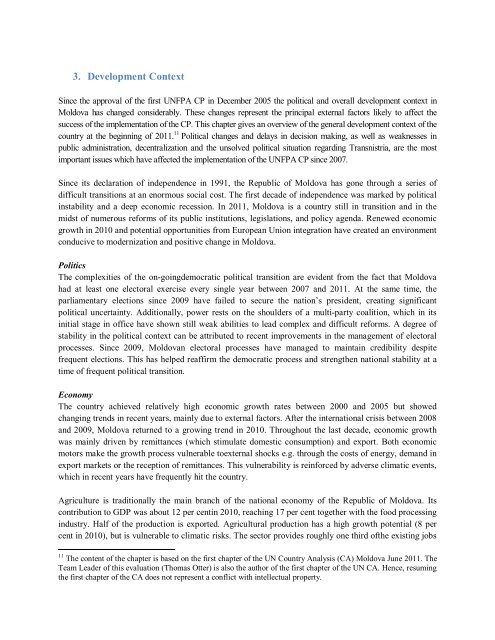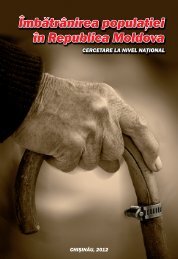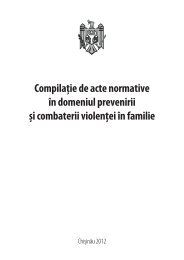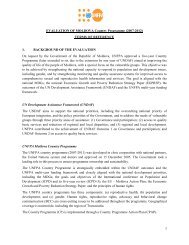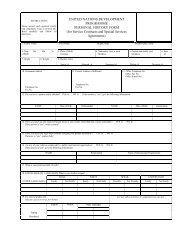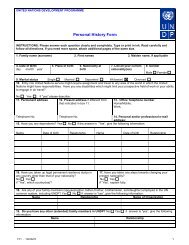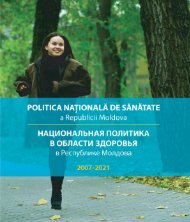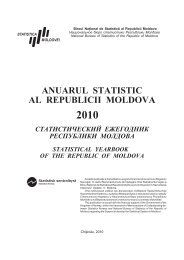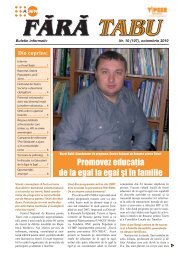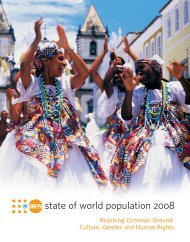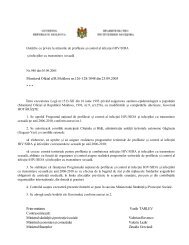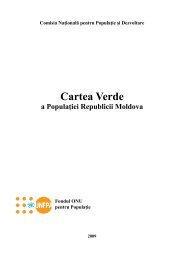Country Programme (2007-2011/2012) evaluation - UNFPA Moldova
Country Programme (2007-2011/2012) evaluation - UNFPA Moldova
Country Programme (2007-2011/2012) evaluation - UNFPA Moldova
Create successful ePaper yourself
Turn your PDF publications into a flip-book with our unique Google optimized e-Paper software.
3. Development Context<br />
Since the approval of the first <strong>UNFPA</strong> CP in December 2005 the political and overall development context in<br />
<strong>Moldova</strong> has changed considerably. These changes represent the principal external factors likely to affect the<br />
success of the implementation of the CP. This chapter gives an overview of the general development context of the<br />
country at the beginning of <strong>2011</strong>. 11 Political changes and delays in decision making, as well as weaknesses in<br />
public administration, decentralization and the unsolved political situation regarding Transnistria, are the most<br />
important issues which have affected the implementation of the <strong>UNFPA</strong> CP since <strong>2007</strong>.<br />
Since its declaration of independence in 1991, the Republic of <strong>Moldova</strong> has gone through a series of<br />
difficult transitions at an enormous social cost. The first decade of independence was marked by political<br />
instability and a deep economic recession. In <strong>2011</strong>, <strong>Moldova</strong> is a country still in transition and in the<br />
midst of numerous reforms of its public institutions, legislations, and policy agenda. Renewed economic<br />
growth in 2010 and potential opportunities from European Union integration have created an environment<br />
conducive to modernization and positive change in <strong>Moldova</strong>.<br />
Politics<br />
The complexities of the on-goingdemocratic political transition are evident from the fact that <strong>Moldova</strong><br />
had at least one electoral exercise every single year between <strong>2007</strong> and <strong>2011</strong>. At the same time, the<br />
parliamentary elections since 2009 have failed to secure the nation’s president, creating significant<br />
political uncertainty. Additionally, power rests on the shoulders of a multi-party coalition, which in its<br />
initial stage in office have shown still weak abilities to lead complex and difficult reforms. A degree of<br />
stability in the political context can be attributed to recent improvements in the management of electoral<br />
processes. Since 2009, <strong>Moldova</strong>n electoral processes have managed to maintain credibility despite<br />
frequent elections. This has helped reaffirm the democratic process and strengthen national stability at a<br />
time of frequent political transition.<br />
Economy<br />
The country achieved relatively high economic growth rates between 2000 and 2005 but showed<br />
changing trends in recent years, mainly due to external factors. After the international crisis between 2008<br />
and 2009, <strong>Moldova</strong> returned to a growing trend in 2010. Throughout the last decade, economic growth<br />
was mainly driven by remittances (which stimulate domestic consumption) and export. Both economic<br />
motors make the growth process vulnerable toexternal shocks e.g. through the costs of energy, demand in<br />
export markets or the reception of remittances. This vulnerability is reinforced by adverse climatic events,<br />
which in recent years have frequently hit the country.<br />
Agriculture is traditionally the main branch of the national economy of the Republic of <strong>Moldova</strong>. Its<br />
contribution to GDP was about 12 per centin 2010, reaching 17 per cent together with the food processing<br />
industry. Half of the production is exported. Agricultural production has a high growth potential (8 per<br />
cent in 2010), but is vulnerable to climatic risks. The sector provides roughly one third ofthe existing jobs<br />
11 The content of the chapter is based on the first chapter of the UN <strong>Country</strong> Analysis (CA) <strong>Moldova</strong> June <strong>2011</strong>. The<br />
Team Leader of this <strong>evaluation</strong> (Thomas Otter) is also the author of the first chapter of the UN CA. Hence, resuming<br />
the first chapter of the CA does not represent a conflict with intellectual property.


